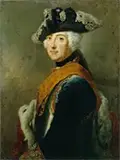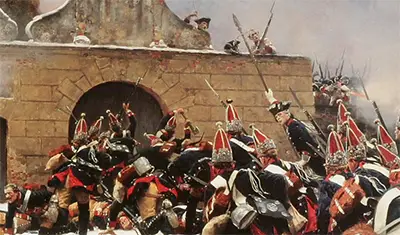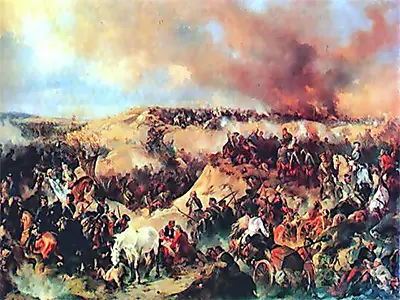The Seven Years War
The Seven Years War was in many ways a worldwide war, featuring all of the major parties in Europe fighting all across the globe. England officially declared war on France in 1756, and this is the date that is traditionally listed as the beginning of the Seven Years War. The two nations had already been fighting for two years by this point, in North America, in what is referred to in American sources as the French and Indian War. American colonists fought against French and Native American forces for nine long years in that conflict, which ended with a comprehensive British victory. 
In Europe, tensions were still thick in the aftermath of the War of the Austrian Succession. In that conflict which raged in 1740–1748, a host of nations including Britain, France, Spain, and Prussia squabbled over who should sit on the throne of the Holy Roman Empire and who should control various territories in Italy, North America, and India. The treaty that ended that war handed Silesia, which had been part of Austria, to Frederick the Great and Prussia, in exchange for Frederick's recognizing the rule of Empress Maria Theresa. Eight years later, other nations of Europe were still worried about the intentions of Frederick the Great and his large and well trained army. Austria, which had lost Silesia in the War of the Austrian Succession, made it known that it wanted Silesia back. Prussia, which had gotten to keep Silesia under the terms of the Treaty of Aix-la-Chappelle, didn't much want to give it back. The major powers of Europe formed two coalitions:

As happened in the previous conflict, Frederick (right) launched into the fighting with an invasion, this time of Saxony in August 1756. Seizing Leipzig and Dresden in short order, the Prussians moved on to Bohemia. After a pause to get through the winter, the Prussians laid siege to Prague in May 1757. As had been the case in the previous war, that city proved rather good at defending itself and Frederick looked elsewhere. Still hoping to take Vienna, he suffered his first defeat at Kolin, losing 13,000 men, and withdrew from Bohemia. Not long afterward, a large Russian force seized the Prussian fortress of Memel and stormed into East Prussia. Russian forces didn't stay in the area long, however; afraid of losing their lines of supply, they headed back east. 
Frederick seized the initiative again. Stunning victories at Rossbach, against a French-Germany army in November (in which French and German losses numbered 10,000 to Prussia's 500), and at Leuthen, against Austria in December, left Prussia in good stead as the 1757 winter encampments took shape. The victory at Leuthen was particularly significant in that Prussia, employing brilliant tactics, prevailed even though outnumbered 2 to 1. Losses were flipped the other way, with the Austrian loss totaling 22,000, including 12,000 captured, and the Prussian losses not topping 7,000. Fond of claiming victory at the slightest draw, Frederick did so after the Battle of Zorndorf, even though his army lost 12,800 of its strength of 35,000. The Russians on the other side lost 18,000 of their 43,000 but, crucially for Frederick's criteria, left the battlefield and headed away. Britain, under Prime Minister William Pitt the Elder, had a grand vision of eclipsing France in as many ways as possible. By the time the Seven Years War began, Britain had scored a number of victories in North America. Britain's alliance with Prussia would only help Britain's ambitions against France. One striking British victory during this time was at the 1759 Battle of Minden, in which an Anglo-Hanoverian force sent a French army running from the field. At nearly the same time, British troops were storming through the Plains of Abraham and seizing Quebec, signaling the beginning of the end of New France. England also held off yet another French seaborne invasion, destroying a French fleet at the Battle of Quiberon Bay in November 1759. 
In the same year, a combined Austrian-Russian army defeated Prussia at Kunersdorf (right), in August. Prussia lost half its force of 50,000 in this battle. The counterstrike was long in coming, but come it did in October 1760 as Austrian and Russian forces occupied Berlin, sending Prussian forces scurrying home to defend their capital. Prussia, seemingly surrounded, fought on, winning at Liegnitz (despite being outnumbered 3 to 1). By 1761, most of the armies on both sides were depleted and exhausted. Prussia was on the brink of defeat when a change in Russian leadership literally made all the difference in the world. The Russian leader, Tsarina Elizabeth, died in January 1762 and was replaced by Czar Peter III. One anti-Prussian leader of Russia had been replaced by another leader of Russia who was pro-Prussia. Peter sought an immediate peace with Frederick and even sent him a good number of troops to seal the bargain. Peter lost his life to an assassin not long afterward, and his wife (who came to be known as Catherine the Great) had no desire to maintain the conflict, respecting the peace that Peter had gained and withdrawing Russian troops entirely. The lengthy battle between France and Great Britain in North America had ground to a halt, and the two sides signed the Treaty of Paris on Feb. 15, 1763. Spain signed on as well, having entered the war just a year before and taking part in just a few battles, mainly in South America but also in Portugal proper. Just five days later, another treaty ended the war entirely. Austria, Prussia, and Saxony signed the Treaty of Hubertusburg. Again, Prussia gained territory; this time, Frederick added Glatz to his latest occupation of Silesia. Austria, for its part, gained Saxony. In the waning years of the war, Britain profited from aggressive naval action in the various theaters, seizing French trading posts in Africa and French interests in the West Indies and taking Florida and Cuba away from a stunned Spain. British gains in India were significant, as evidenced by Robert Clive's decisive victory in the Battle of Plassey, recapturing of Calcutta, and seizing of the French capital, Pondicherry. In the years that followed, Britain would press its advantage as the dominant naval power, protecting an empire, as the saying went, "on which the sun never set." Prussia also emerged as a strong force after the war and remained the dominant power in German circles and in much of Continental Europe for another century. France suffered greatly, in terms economic and political. Also racking up an enormous debt during the war was Great Britain. In the two decades after the war, various British ministers invented a number of ways to tax the American colonists, in hopes of convincing them to pay for the army that defended their homeland. Americans reacted to such taxes with varying degrees of outrage and active resistance. |
|
Social Studies for Kids
copyright 2002–2024
David White




